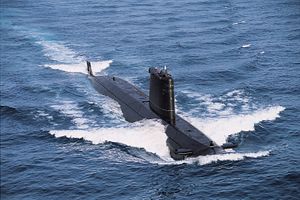Turkish defense firms STM and HAVELSAN continue to plug away at modernizing the first of three Pakistani Agosta 90B diesel-electric submarines. The contract to upgrade the submarines marked the first time a Turkish firm was selected as the prime contractor for a third country submarine project, Daily Sabah reported.
Turkey was selected in 2016 for a $350 million contract to upgrade the vessels, which will play an increasingly important part in the Pakistani naval fleet as they take on a nuclear role. The Babur-3 submarine-launched cruise missile, which entered tested in 2017, will become the first undersea nuclear capability for Pakistan. The missile has been tested twice to date.
The Turkish upgrades to the Agosta 90Bs — beginning with PNS Hamza, the first of the vessels — are extensive. According to Daily Sabah, the scope of the modernization includes the “entire sonar suite of the submarine ship, periscope systems, command and control system, and radar and electronic support systems.” HAVELSAN is providing the software suite for these upgrades.
The report continues:
Furthermore, KASIF, the geographic information system (GIS) software developed by HAVELSAN through domestic means, is used in the infrastructure of the Command and Control System. The Sonar Integrated Submarine Command Control System (SEDA), developed by HAVELSAN, will be Turkey’s first export item in this field. The system will be transferred to Karachi shipyard this month for installation. PNS Hamza, the first submarine to be modernized within the scope of the project, is planned to be launched in 2020.
The total modernization of all three vessels is slated to be completed in “less than three years,” according to Daily Sabah. Pakistan will also acquire eight Chinese-made S20 diesel-electric submarines — export variants of the People’s Liberation Army-Navy’s Type 039A — in the 2020s.
Pakistan’s Agosta 90B diesel-electric submarines are internally designated the Khalid-class. Three vessels—PNS Hamza, PNS Khalid, and PNS Saad—are in the Pakistani Navy’s inventory. PNS Khalid was built in France in the 1990s while Hamza and Saad were built in Pakistan in the 2000s.
Apart from the Babur-3 SLCM, which remains in testing, the Agosta 90Bs are capable of launching 16 533 mm torpedoes and SM39 Exocet anti-ship missiles.
According to Pakistan’s Inter-Services Public Relations (ISPR), the Babur-3 is capable of “delivering various types of payloads” and uses “underwater controlled propulsion.”
Pakistani Maj. Gen. Asif Ghafoor, the head of ISPR, has said that the Babur-3 SLCM was developed as a response to “provocative nuclear strategies and posture being pursued in the neighborhood through induction of nuclear submarines and ship-borne nuclear missiles.”

































